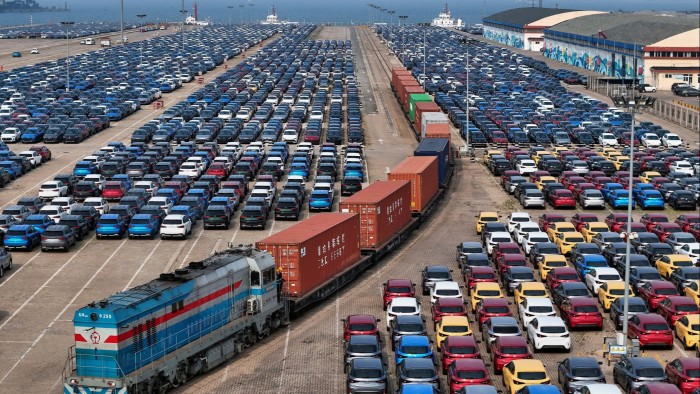Stay informed with free updates
Simply sign up to the Chinese trade myFT Digest — delivered directly to your inbox.
China’s exports grew sharply in April despite Donald Trump’s “liberation” day tariffs on shipments to the US, strengthening Beijing’s hand ahead of crucial trade negotiations due to start this weekend.
The strong performance came as Chinese companies diverted trade flows to south-east Asia, Europe and other destinations following the imposition of prohibitively high tit-for-tat tariffs between the world’s two largest economies.
Exports rose 8.1 per cent in dollar terms compared with a year earlier, China’s customs said on Friday, beating analysts’ forecasts in a poll by Reuters of 1.9 per cent growth but slowing from 12.4 per cent growth in March, when figures were buoyed by exporters seeking to get ahead of expected tariffs by frontloading shipments to the US.
Imports shrank 0.2 per cent in April, the third consecutive month of declines, which will increase concerns over China’s burgeoning trade surpluses that are the source of much of its tensions with the US.
“This looks worse for the US going into trade talks,” said Lynn Song, chief economist for Greater China at ING, adding the contraction in Chinese imports appeared to have come at the expense of US exports to the country.
Heron Lim, an economist at Moody’s Analytics, said that, while China’s trade with the US dropped 21 per cent year-on-year in April, it rose by an equal percentage with south-east Asian nations and 8 per cent with the EU.
“The largest increases in outbound shipments went to Indonesia, Thailand and Vietnam,” Lim said.
The strong performance promises to pile pressure on US trade negotiators who are preparing to meet their Chinese counterparts for negotiations in Geneva starting on Saturday.
Treasury secretary Scott Bessent and trade representative Jamieson Greer will represent the US, while China has said its delegation will be led by vice-premier He Lifeng, its top economic official.
Trump last month increased tariffs on most Chinese goods to as much as 145 per cent, and said he would impose new levies on even small-value packages from the country. Beijing responded with tariffs of 125 per cent.
He also initially levied punishing tariffs on Vietnam, Thailand and other south-east Asian countries that have racked up huge trade surpluses with the US. Many companies have built manufacturing bases in those countries as an alternative to China.
Trump later announced a 90-day pause on the “liberation day” tariffs pending negotiations with most countries except China, reopening the possibility of exporters channelling their goods to the US through south-east Asia.
Bookings for Chinese shipments to the US were down between 30 and 50 per cent, Jens Eskelund, president of the European Union Chamber of Commerce in China said on Thursday. But he said bookings to the rest of the world were rising.
“Chinese exports to the rest of Asia appear to be performing particularly strongly but also to the Middle East and to some extent also Europe,” he said. “Of course China is impacted . . . but we see other markets to some extent being able to pick up some of the goods that are not going to the United States.”
China’s trade surplus with the US stood at $20.46bn in April and at $96.2bn overall. But shipments to the US declined 17.6 per cent compared with the previous month, indicating that China had increased trade with alternative markets.
Recommended
In a statement analysing China’s trade in renminbi terms over the past four months, customs officials noted that trade had grown with countries in south-east Asia, the EU and along the Belt and Road Initiative, Beijing’s signature international infrastructure drive. Trade with the US, it added, had declined.
Jorge Toledo, EU ambassador to China, on Friday criticised China’s ballooning trade imbalance with the bloc, adding that there was “huge concern” over Beijing’s export controls and the “lack of level playing field for European companies”.
“The situation is not improving . . . something has to be done,” he said at the China Europe International Business School in Shanghai.
Lu Daliang, a customs spokesperson, said that China’s “all-round co-operation with neighbouring countries continued to deepen and economic and trade relations became increasingly close”, according to Chinese state news agency Xinhua.
Additional reporting by Edward White in Shanghai




